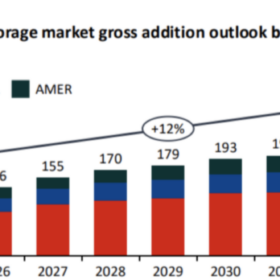Electricity generated by solar farms at Parkes and Griffith, and from wind farms in the New England area due to come online in 2024, will supply 80% of the council’s total electricity load for larger energy use sites, like the Moruya admin building, pools, libraries, water and sewer pump stations, treatment plants and our streetlights.
The move will reduce the council’s carbon emissions the equivalent to removing 1,000 cars from the road per annum and puts council well on its way to achieve its target of sourcing 100% of electricity from renewables by 2030.
Council’s environment services manager Deb Lenson said the council’s electricity bill was about $1.5 million each year.
She said the power purchase agreement was secured at a competitive price with renewable energy company Simply Energy, ENGIE, with help from Renewable Energy Hub.
“We’re really excited to move away from a reliance on fossil fuels, reduce our CO2 emissions and having a clean source of energy,” Lenson said.
“We’re now well on course to achieving our target of sourcing 100% of the council’s energy from renewables by 2030 and reducing our CO2 emissions.
“We’ll continue to look for other opportunities to supply renewable energy for the remaining 20% of council facilities, which are our smaller sites that use less power, like community halls and public toilets.”
Meanwhile, Council has been reviewing its Emissions Reduction Plan. A new plan will include more actions for council to reduce its greenhouse gas emissions and make the organisation more climate resilient.
It will also look to include actions that help the wider community become more climate resilient and help reduce Eurobodalla’s environmental footprint.






By submitting this form you agree to pv magazine using your data for the purposes of publishing your comment.
Your personal data will only be disclosed or otherwise transmitted to third parties for the purposes of spam filtering or if this is necessary for technical maintenance of the website. Any other transfer to third parties will not take place unless this is justified on the basis of applicable data protection regulations or if pv magazine is legally obliged to do so.
You may revoke this consent at any time with effect for the future, in which case your personal data will be deleted immediately. Otherwise, your data will be deleted if pv magazine has processed your request or the purpose of data storage is fulfilled.
Further information on data privacy can be found in our Data Protection Policy.